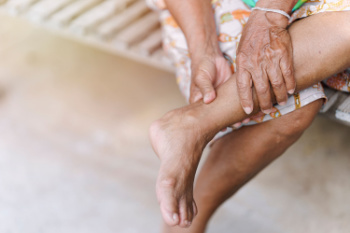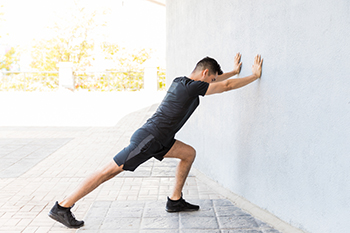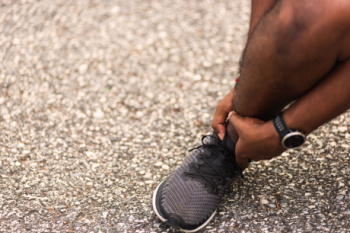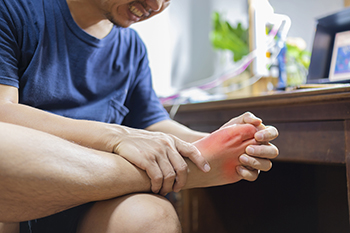Items filtered by date: February 2024
Why Regular Foot Check-Ups Are Important for Older Adults
 Regular foot check-ups are important for older adults to help identify potential problems early on. Getting treatment for any issues also prevents these problems from escalating into more serious conditions. As people age, changes in foot structure, skin integrity, and circulation can occur, making the feet more susceptible to various issues, such as pain and cracked heels. Regular check-ups become especially important for those with chronic conditions like diabetes or arthritis, as these can significantly impact foot health. Certain conditions, like plantar fasciitis and osteoarthritis, become more likely with repetitive movement and the natural wear and tear that comes with aging. Podiatrists can assess the risk of developing complications, provide personalized advice on footwear, and offer guidance on preventive measures. If you have concerns about your foot health as an older adult, or if you are experiencing foot pain, it is suggested that you schedule an appointment with a podiatrist.
Regular foot check-ups are important for older adults to help identify potential problems early on. Getting treatment for any issues also prevents these problems from escalating into more serious conditions. As people age, changes in foot structure, skin integrity, and circulation can occur, making the feet more susceptible to various issues, such as pain and cracked heels. Regular check-ups become especially important for those with chronic conditions like diabetes or arthritis, as these can significantly impact foot health. Certain conditions, like plantar fasciitis and osteoarthritis, become more likely with repetitive movement and the natural wear and tear that comes with aging. Podiatrists can assess the risk of developing complications, provide personalized advice on footwear, and offer guidance on preventive measures. If you have concerns about your foot health as an older adult, or if you are experiencing foot pain, it is suggested that you schedule an appointment with a podiatrist.
If you need your feet checked, contact Dr. Steven Sheridan of Ankle & Foot Specialty Clinics. Our doctor will attend to all of your foot and ankle needs and provide you with quality treatment.
Geriatrics and Podiatry
When people age, some common issues that may occur are bone density loss, dry skin, poor circulation, and rough brittle nails. These issues may also affect your foot health if the necessary steps are not taken to alleviate the problems.
It is important to take care of your feet because feet that are injured or diseased can affect your overall health. Having painful feet hinders your ability to do daily activities or may decrease your willingness to do the things that you need to do.
Visiting Your Geriatrician
As we age, health problems become more likely, so it is essential to visit your doctor for check-ups to ensure that you are doing the best you can to take care of your health. It is recommended to check your feet frequently for any possible cuts, bruises, swelling, corns or any other irregularities.
Taking Care of Elderly Feet
Cracked or dry feet can be treated by applying moisturizer often. It is also important not to wear old socks because the older the sock is, the higher the possibility there will be that there is bacteria there. Wear fresh socks and make sure they fit properly.
Proper foot health means that you can have a more active lifestyle and you will not be bogged down by pain. Foot health also leads to good circulation, which is paramount for overall health.
If you have any questions, please feel free to contact our office located in Sandusky, MI . We offer the newest diagnostic tools and technology to treat your foot and ankle needs.
The Importance of Achilles Tendon Stretching Post-Injury

Stretching the Achilles tendon after an injury is paramount for facilitating recovery, restoring flexibility, and preventing future issues. Whether from overuse, strain, or rupture, Achilles tendon injuries can be debilitating, impacting mobility and quality of life. Gentle stretching exercises play an essential role in promoting healing and preventing stiffness, which can hinder rehabilitation progress. Simple stretches, such as calf raises, wall stretches, and towel stretches, help elongate the Achilles tendon and calf muscles, reducing tension and promoting blood flow to the injured area. It is essential to approach stretching with caution, starting gradually and avoiding overexertion to prevent further damage. Consistency is key, as regular stretching sessions can gradually improve flexibility and range of motion in the Achilles tendon and surrounding muscles. Incorporating stretching exercises into a comprehensive rehabilitation program, under the guidance of a podiatrist, can accelerate recovery and minimize the risk of reinjury. If you have endured an Achilles tendon injury, it is suggested that you speak with a podiatrist who can guide you toward stretches that are correct for you.
Achilles tendon injuries need immediate attention to avoid future complications. If you have any concerns, contact Dr. Steven Sheridan of Ankle & Foot Specialty Clinics. Our doctor can provide the care you need to keep you pain-free and on your feet.
What Is the Achilles Tendon?
The Achilles tendon is a tendon that connects the lower leg muscles and calf to the heel of the foot. It is the strongest tendon in the human body and is essential for making movement possible. Because this tendon is such an integral part of the body, any injuries to it can create immense difficulties and should immediately be presented to a doctor.
What Are the Symptoms of an Achilles Tendon Injury?
There are various types of injuries that can affect the Achilles tendon. The two most common injuries are Achilles tendinitis and ruptures of the tendon.
Achilles Tendinitis Symptoms
- Inflammation
- Dull to severe pain
- Increased blood flow to the tendon
- Thickening of the tendon
Rupture Symptoms
- Extreme pain and swelling in the foot
- Total immobility
Treatment and Prevention
Achilles tendon injuries are diagnosed by a thorough physical evaluation, which can include an MRI. Treatment involves rest, physical therapy, and in some cases, surgery. However, various preventative measures can be taken to avoid these injuries, such as:
- Thorough stretching of the tendon before and after exercise
- Strengthening exercises like calf raises, squats, leg curls, leg extensions, leg raises, lunges, and leg presses
If you have any questions please feel free to contact our office located in Sandusky, MI . We offer the newest diagnostic tools and technology to treat your foot and ankle needs.
Root Causes of Heel Pain

Understanding the root causes of heel pain is essential for effective treatment. Mechanical factors such as acute injuries, like a ruptured plantar fascia, are common causes of heel pain. Degenerative conditions, such as plantar fasciitis or calcaneal stress fractures, also may significantly affect the heel. Neurologic causes, including nerve compression and inflammation of the Achilles tendon, can cause heel discomfort, especially during activities. Rheumatologic conditions, such as psoriatic arthritis or rheumatoid arthritis, can lead to chronic inflammation and persistent heel pain. Differentiating between these causes is vital for tailored treatment plans, which may involve orthotic devices, certain exercises, or reducing pressure on affected tendons during acute phases. Additionally, addressing contributing factors like foot pronation, inadequate footwear, or high-impact physical activities is important for long-term management. If you are experiencing heel pain that interferes with your daily activities, it is suggested that you schedule an appointment with a podiatrist for a full exam and diagnosis, followed by suggesting correct treatment options for you.
Many people suffer from bouts of heel pain. For more information, contact Dr. Steven Sheridan of Ankle & Foot Specialty Clinics. Our doctor can provide the care you need to keep you pain-free and on your feet.
Causes of Heel Pain
Heel pain is often associated with plantar fasciitis. The plantar fascia is a band of tissues that extends along the bottom of the foot. A rip or tear in this ligament can cause inflammation of the tissue.
Achilles tendonitis is another cause of heel pain. Inflammation of the Achilles tendon will cause pain from fractures and muscle tearing. Lack of flexibility is also another symptom.
Heel spurs are another cause of pain. When the tissues of the plantar fascia undergo a great deal of stress, it can lead to ligament separation from the heel bone, causing heel spurs.
Why Might Heel Pain Occur?
- Wearing ill-fitting shoes
- Wearing non-supportive shoes
- Weight change
- Excessive running
Treatments
Heel pain should be treated as soon as possible for immediate results. Keeping your feet in a stress-free environment will help. If you suffer from Achilles tendonitis or plantar fasciitis, applying ice will reduce the swelling. Stretching before an exercise like running will help the muscles. Using all these tips will help make heel pain a condition of the past.
If you have any questions please contact our office located in Sandusky, MI . We offer the newest diagnostic and treatment technologies for all your foot and ankle needs.
Connecting Gout and Diet

Gout, a form of arthritis notorious for its agonizing pain, stems from the accumulation of uric acid crystals in the joints. While predominantly striking the big toe due to its anatomical distance from the heart, gout can also affect other joints throughout the body. Managing gout often involves navigating dietary choices, particularly purine-rich foods. Organ meats and certain cuts of meat, as well as acidic fare, can worsen symptoms. Lentils, beans, and some plant-based proteins also contain purines, though their impact on gout development remains debated. While gout cannot be cured, its frequency and severity can be managed through a combination of medication and changes to the types of foods you eat. By understanding the intricate interplay between diet and gout, individuals can proactively manage this debilitating condition, enhancing their quality of life and minimizing its disruptive effects. For additional help in reducing the effects of gout, it is suggested that you consult a podiatrist who is trained to treat and manage this condition.
Gout is a painful condition that can be treated. If you are seeking treatment, contact Dr. Steven Sheridan from Ankle & Foot Specialty Clinics. Our doctor will treat your foot and ankle needs.
What Is Gout?
Gout is a form of arthritis that is characterized by sudden, severe attacks of pain, redness, and tenderness in the joints. The condition usually affects the joint at the base of the big toe. A gout attack can occur at any random time, such as the middle of the night while you are asleep.
Symptoms
- Intense Joint Pain - Usually around the large joint of your big toe, and it most severe within the first four to twelve hours
- Lingering Discomfort - Joint discomfort may last from a few days to a few weeks
- Inflammation and Redness -Affected joints may become swollen, tender, warm and red
- Limited Range of Motion - May experience a decrease in joint mobility
Risk Factors
- Genetics - If family members have gout, you’re more likely to have it
- Medications - Diuretic medications can raise uric acid levels
- Gender/Age - Gout is more common in men until the age of 60. It is believed that estrogen protects women until that point
- Diet - Eating red meat and shellfish increases your risk
- Alcohol - Having more than two alcoholic drinks per day increases your risk
- Obesity - Obese people are at a higher risk for gout
Prior to visiting your podiatrist to receive treatment for gout, there are a few things you should do beforehand. If you have gout you should write down your symptoms--including when they started and how often you experience them, important medical information you may have, and any questions you may have. Writing down these three things will help your podiatrist in assessing your specific situation so that he or she may provide the best route of treatment for you.
If you have any questions, please feel free to contact our office located in Sandusky, MI . We offer the newest diagnostic and treatment technologies for all your foot care needs.

